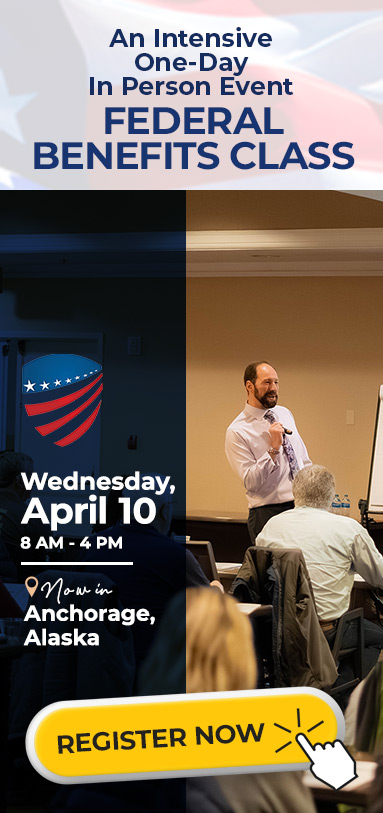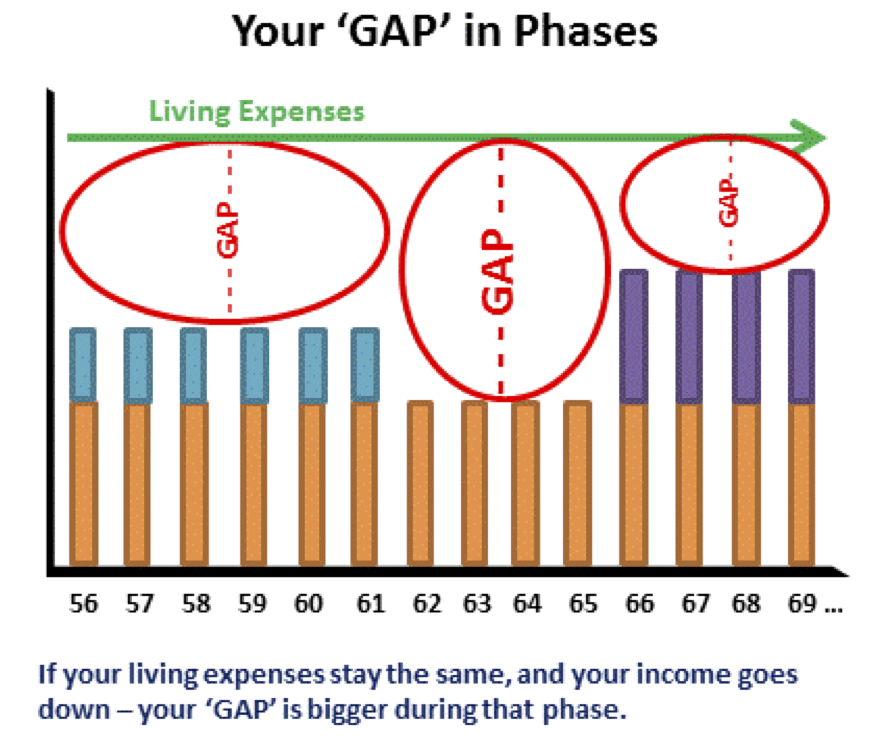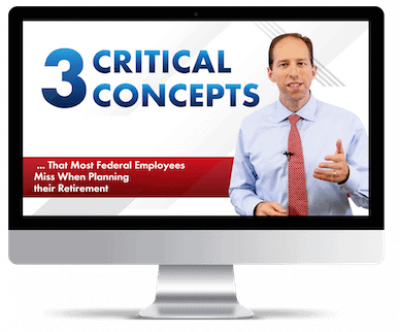Retirement Planning for Federal Employees is Different
Retirement planning for federal employees is unique. As a Federal Employee, you know you have one of the most complex benefits systems around. I also think it’s one of the best, if you can learn to navigate all of the rules, regs and unique twists and turns.
Over the years I’ve had the opportunity to help my clients, individual federal employees, through the entire retirement process.
On thing I’ve learned over the years is that Federal Employees really do have unique needs when it comes to financial planning for retirement. And these are needs that most generic retirement financial planning doesn’t address.
What’s Good for Most – Could be Bad for Federal Employees
Over the years, I’ve found that many of the recommendations in standard financial planning for retirement make sense for most private sector employees.
But when applied to federal employees – might cause them to lose out on some of their best federal benefits.
What’s Different About Retirement Planning for Federal Employees?
What are some of the unique considerations Federal Employees need to think of when doing their financial planning for retirement?
As a Federal Employee…
- Your income in retirement will start, stop and change in ways that befuddle most retirement planning software
- You have unique investment and benefits choices that private sector employees don’t have
- You have benefits that give you a head start at retiring sooner than most private sector employees
But – as a Federal Employee you also have to navigate one of the most complex benefits systems in the world. And if you make the wrong choices, you could miss out on some of your best benefits.
And you’ll also need to take responsibility for keeping your own records – as Federal Employees can also encounter more issues with getting credit for time worked towards their retirement than most private sector employees.
Your Retirement Income Starts, Stops and Changes
As a Federal Employee, one unique challenge you’ll have in financial planning for retirement is handling how your retirement income may start, stop and change along the way.
Most financial retirement planning calculators are designed for private sector employees – whose retirement income is pretty straight forward. It starts at a certain time, and then keeps going. And it might be increased by a small percentage over retirement – but there really aren’t any dramatic changes.
But if you’re a FERS – your retirement income will start, stop and change in unique ways. This creates unique ‘gaps’ in your retirement income that most calculators can’t computer.
You need to understand how your federal retirement income will change, and how you will fill your ‘gaps’. Determining how you fill your ‘gaps’ is a critical part of financial planning for retirement.
You Have Unique Investment & Benefit Choices as a Federal Employee
As a Federal employee, you have access to some unique investment and benefits choices.
I would say your top unique benefits would be…
Thrift Savings Plan
With the Thrift Savings Plan, you have a tremendous tool to help you accumulate retirement savings. Not only does the TSP have some of the lowest fees around, you have simple, straight-forward investment choices in the different TSP funds. And you just can’t beat the TSP match for FERS.
And while it’s true that most of the TSP funds can be ‘mirrored’ by choosing other indexes, the G Fund is a unique investment choice available only inside of the Thrift Savings Plan.
Keeping FEHB in Retirement
Being able to keep FEHB into retirement is a *HUGE* benefit in and of itself. But not only do most federal employees qualify to keep FEHB coverage after they retire – the government will continue to pay up to 72% of the premium. That is almost unheard of in the private sector.
I don’t think I can adequately explain in a paragraph just how amazing this benefit is to your retirement. But not everyone is eligible to continue FEHB into retirement. Make sure you will be eligible to keep your *BEST* retirement benefit.
For CSRS: Voluntary Contributions Program (CSRS VCP)
For CSRS federal employees, you may be eligible for one of the most unique benefits of all, the CSRS Voluntary Contributions Program (CSRS VCP).
Unfortunately, there is no equivalent in the FERS retirement system to the VCP benefit – and I’ve never come across anything like it in the private sector. To learn more about the CSRS VCP, check out our page on CSRS Voluntary Contributions.
These are just a few of your unique benefits to consider when doing your financial planning for retirement. And of course, there’s more to know about the benefits we’ve just discussed.
Let’s look now at a few of your benefits that stack the deck in your favor when it comes to financial planning for retirement.
Federal Benefits That Give You a Head Start on Retiring Sooner
As a Federal Employee, you have some excellent benefits. And some are so good that they really do give you a head start when it comes to financial planning for retirement.
Not only do you have an excellent pension, as a FERS or CSRS, your ability to continue FEHB coverage into retirement is a phenomenal benefit that makes it possible to retire sooner than most.
And for FERS, the FERS Supplement can provide extra income that helps make retirement easier to plan for.
Very Few Financial Professionals Understand Your Federal Benefits
Federal retirement benefits are so complex and unique – it’s important to approach them in their own light.
Very few financial professionals really understand your federal benefits.
So when many financial professionals look at federal benefits – they try to compare them to a benefit in the private sector that they are familiar with.
And this might be a fine place to start – but if a professional isn’t fully familiar with the quirks of federal benefits – it can lead to faulty assumptions and bad recommendations.
Why *You* Need to Understand Your Federal Retirement Benefits
So you have some amazing federal retirement benefits – but you also have some important responsibilities.
As a federal employee, you have to navigate one of the most complex benefits programs around. And if you make the wrong choices, you could miss out on some of your best benefits.
When you are doing your financial planning for retirement – you need to remember your unique benefits.
And *YOU* need to understand them – because many financial professionals don’t.
If they don’t understand your benefits – they could be making recommendations that don’t make the most of your benefits – or worse, they could make recommendations that make sense for ‘most people’ but that make you lose out on some of your best federal retirement benefits.
Another reason for *YOU* to understand your benefits is that when you use most financial calculators – they won’t compute your benefits correctly. And you need to know enough about your benefits to spot those problem areas so you don’t make retirement plans based on incorrect calculations.
Your Federal Benefits are Just One Piece of Your Financial Puzzle
Your federal benefits are just one piece of your financial puzzle. It’s important to understand your benefits – and then understand how they fit into your broader financial picture.
Because the areas of your financial life are all connected – and decisions you make in one area really do affect the other areas. And if you make decisions by looking only at one ‘piece of the pie’ at a time – it can create unintended side effects for other areas.
This is why it’s so important to understand your federal benefits from a financial planning perspective.
This is what I help my clients with – and this is what I want to help you with.
Find out more about how I help my federal employee clients.
We seen the mistakes that people (and even some professionals!) can make, and we want to help you avoid them. Click the button below to learn more.
7 CRITICAL MISTAKES
Federal Employees make
✗ Forgetting to check your beneficiary designations
✗ Expecting pension check to arrive in 30 days after retiring
✗ Not knowing the difference between SCD vs. RSCD
✗ Completing retirement paperwork incorrectly
✗ Failing to prepare financially for retirement
✗ Failing to understand tax consequences
✗ Getting bad advice
Click the button below and learn how to avoid these mistakes while planning YOUR retirement










![live127123 [Converted] 1-01 live127123 [Converted] 1-01](https://plan-your-federal-retirement.com/wp-content/uploads/elementor/thumbs/live127123-Converted-1-01-qlhfxt1jl8nai44kz1xk5u4shejeynh2t7i0txhx7c.png)